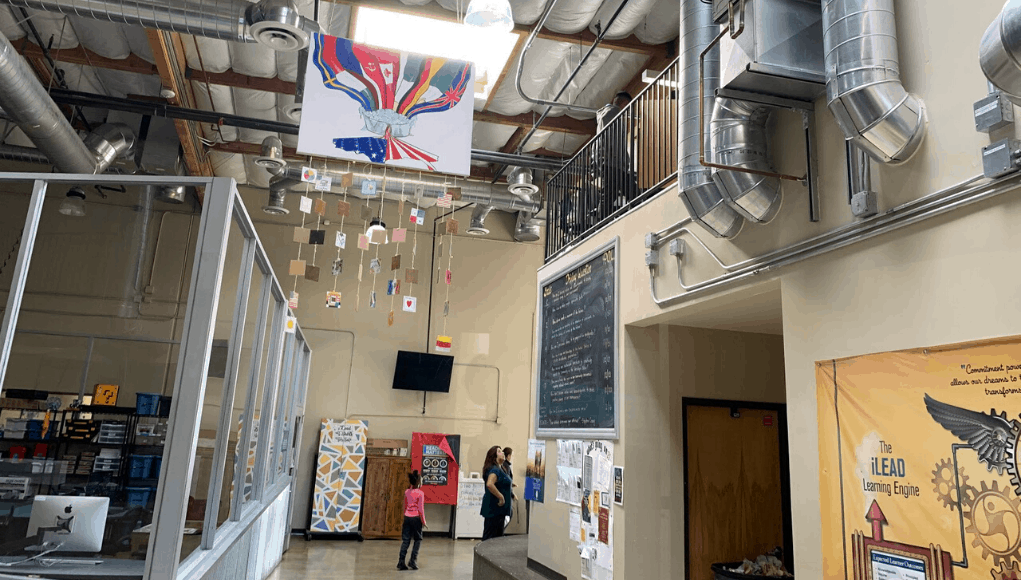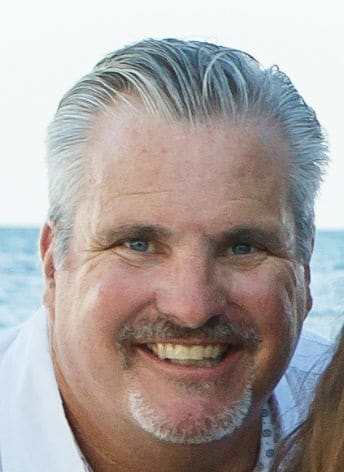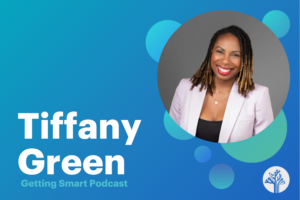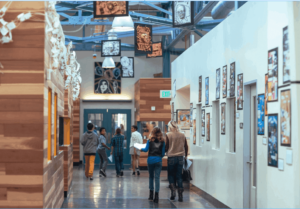iLEAD Schools Creating Authentic, High Quality Project-Based Learning Environments

As a longtime project-based learning (PBL) practitioner, facilitator and advocate, I am continually on the lookout for a school, or school system, that has not only embraced PBL as pedagogy but is truly making it a reality as a daily practice. Many educational systems are talking a big game of deeper and more personalized inquiry-based learning, but a visit will typically reveal that they often lack the culture, creativity, and commitment to necessary elements that facilitate high-quality PBL for all students.
As a writer and facilitator, I have been fortunate to visit places that are the real deal. They not only talk the talk but ultimately walk the walk. Some are known internationally such as High Tech High. Some are newer and lesser-known such as Ella Baker Elementary (I wrote about them last spring) However, after my most recent visit to iLEAD Schools, a network of several project-based charter schools in Southern California, I am convinced that they are taking inquiry-based learning to the next level. Founded in 2009 – and now also featuring programs in Colorado, Hawaii and Ohio – iLEAD Schools feature such diverse programmatic offerings such as home school, online and hybrid programs. Indeed, they serve students who attend school daily to those that are teen parents, as well as everyone in between.
The iLEAD Introduction
Their name defines who they are. The “i” stands for International and is an immediate acknowledgment that iLEAD students are global citizens who are active in their communities and are compassionate, open-minded and globally-focused. The “L” represents Leadership – a practice that prepares learners for a lifetime of listening, collaborating and inspiring. There is “e” for Entrepreneurial Development – encouraging learners to work in teams, take risks and learn from failure. The “a” is for Arts aimed at creating and exploring the world through the artistic experience that enhances all subject areas for our leaders. Finally, there is the “d” for Design Thinking that leads to more meaningful experiences and a deeper understanding for learners.
Everything at iLEAD is intentional and by design. Students are Learners and Teachers are Facilitators. And it all starts with The Learning Engine.
The Learning Engine
iLEAD doesn’t just make the usual nod towards the importance of the learning environments, but rather they make it foundational in their deeper learning pedagogy. Based on David Thornburg’s book From the Campfire To the Holodeck, iLEAD has strategically and intentionally place learning spaces at the center. They acknowledge that one’s learning spaces are indicative of what type of learning culture one ultimately creates. The theory of Thornburg’s work centers on designing to help schools move from traditional learning spaces (lecture halls or the campfire) where students just receive information to schools that encourage immersive student-centered learning.
At iLEAD, this works in the following ways: Of course, there is still The Campfire, but it’s maximized as a community space where students are given just enough information to tackle the challenges ahead of them. Additionally, this space can also be led or facilitated by students to address the larger learning community. There is The Watering Hole for social learning such as spontaneous meetings, student collaboration, and brainstorming. This is where students can process and take action based on the information at the campfire. Then there is The Cave, often lacking in traditional schools, where students can retreat to for solitary, reflective and self-directed learning. There is the Life space where students get opportunities to apply their learning – often referenced as a design portion of learning. They get to take their ideas to The Makery in order to tinker, experiment and make. This is where student creativity is unleashed. Additionally, instead of computer labs, there are Exploratoriums. There is The Village where learners come together to present and share their learning. Ultimately, there is The Holodeck, where students are in immersive learning experiences and can participate in cross-disciplinary missions using technology and community resources. iLEAD has created a culture of learning that allows for the realization of the Holodeck.
Public Work & Reflection
Presenting one’s work publicly is an essential pedagogical foundation of PBL. It all begins when the projects are launched. The driving question – responsible for grounding and focusing the nature of the students’ inquiry – are made public not just to all of the students but the entire community. Anyone on campus can see the current inquiry-focused challenges and pursuits of all the students. Recent examples on my visit included:
- 2nd Grade – “How can we, as zoologists, create sustainable habitats?
- 3rd Grade – “How can we take care of our environment and inspire others to help?
- 5th Grade – “How can we use data to reduce our families’ impact on the environment?”
- 6th Grade – “How can we use sustainable practices to positively impact our community?
- 7th Grade – “How can we bridge the gap in our community resources regarding cultural – social issues?”
- 8th Grade – “How can I become active and knowledgeable to create a positive change in our environment?”
All of the learners’ projects include a Presentation of Learning. These are public opportunities for students to present their final products and articulate what they have learned. In these presentations, students discuss the impact or result of that learning on themselves, their community and the greater world. Learners present to their peers, facilitators, family and community members, experts and partners.
PBL advocates regularly discuss the powerful learning that comes from reflection (metacognition). They often refer to the words of John Dewey who said, “We do not learn from experience – we learn from reflecting on that experience.” All iLEAD learners have a culminating capstone experience that concludes each year in the form of a Showcase Of Learning. This impacts their future learning goals and pursuits. What’s possibly even more powerful – from a school leadership and culture perspective – is that all of the facilitators have to present at the Showcase of Learning as well. This is a public opportunity to share what they have learned in the past year as a facilitator and how this will impact their teaching and learning in the future.
Projects At Work
In addition to the work reflected in the aforementioned driving questions and presentations of learning, iLEAD students have many unique opportunities to work on large, public projects that have international partners and implications. One of the best examples is iLEAD’s Student Aerospace Projects that include topics such as Genes in Space, Science Accelerator, UAV Design & Flight Training, Dreamup to Space and the Soaring Aeronautics Glider. What makes these projects powerful is that students are partnering with entities such as NASA and experiencing high-level peer collaboration with students in places such as Israel.
Another one of the many unique ventures at iLEAD is what schools such as iLEAD Aguadulce are doing with Play-Based Learning school-wide. Students experience a rigorous, PBL curriculum with an emphasis on being encouraged to play that is all supported by the latest brain research. Students play both indoors and outdoors in order to experiment, innovate, create, collaborate and increase their emotional intelligence all whilst becoming part of a very active learning community. Whether it’s allowing students to climb a tree or raise chickens or rabbits, the iLEAD Aguadulce school and community have adopted the mantra Free Range Children as a way to explain how their learners are encouraged to play in order to learn. Ultimately, all iLEAD students are encouraged to be Makers. At iLEAD, this is not jargon. Being Makers is how they see all learners and facilitators. Indeed, iLEAD is working on professional development gatherings and ongoing opportunities for educators worldwide in the areas of Being Makers, Play-Based Learning and more.
All Students
We often hear educational systems refer to “all students.” More than ever, there is a universal acknowledgment that most, if not all, of our educational endeavors seem to leave people out (often those furthest removed from opportunity). This is not often referred to as equity. At iLEAD, this seems to be just how they do business. iLEAD offers different programs and avenues for all students K-12. One of these unique programs is Empower Generations that began as a place for teen parents – who often went to alternative education and eventually dropped out – to customize a learning experience that was relevant, meaningful and authentic to them. Instead of quietly getting these students out of the mainstream, iLEAD creates an environment and culture that not only allows these students to flourish but become empowered learners who take control of their own learning and lives. The program not only includes the requisite childcare opportunities but incorporates immediate opportunities for these students to advance the health and wellness of themselves and their families with family seminars, internships, mentorships, college courses, career development, and a powerful, personalized learning community. Empower Generations has been so successful that it is now attracting and enrolling many students that are not teen parents, but looking for a highly personalized and supportive environment focused on personal empowerment.
See For Yourself
It’s difficult to do justice to all things that iLEAD Schools are doing with PBL. They offer free tours of all of their southern California sites, as well as the schools in Colorado, Hawaii, and Ohio. Feel free to contact Matt Watson, Director of Maker Outreach iLEAD California for more information. You can also engage them professionally about learning collaboratives and opportunities at Being Makers. iLEAD is a group of creative and committed lifelong learners truly trying to transform the learning experiences for all students.
For more, see:
- Ella Baker Elementary Shines A Bright Light On Learning
- Learner-Centered Schools in Albemarle County
- 100+ Middle and High Schools Worth Visiting
Stay in-the-know with innovations in learning by signing up for the weekly Smart Update.






0 Comments
Leave a Comment
Your email address will not be published. All fields are required.